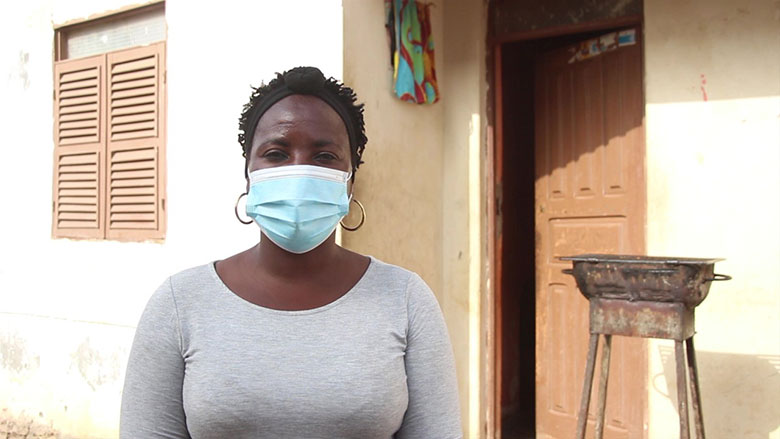Challenge
Strict containment measures were adopted in March 2020, and a state of emergency was declared for the first time in the country to reinforce the COVID-19 containment measures. Cabo Verde was one of the hardest hit countries in the region in terms of the economic downturn. The economy was projected to contract by 11 percent in 2020, and the pandemic was expected to have negative short-, medium- and long-term impacts on people's lives, especially for the poorest and most vulnerable. Women constitute the majority of informal and domestic workers as well as workers in the tourism sector. As such, social distancing measures considerably reduced the demand for these services, and they were disproportionally affected by the economic impact of the pandemic. There was also a risk that households would resort to negative coping strategies, such as reducing the amount and quality of food, not seeking medical treatment even if sick, selling off assets, sending children to work, and/or not adhering to potential future lockdowns and social distancing measures, thereby increasing exposure to becoming infected with COVID-19. These could result in worsening human capital conditions with profound and irreversible long-term negative impacts.
Approach
The Social Inclusion Project is coupled with technical assistance from the World Bank and the International Labor Organization (ILO) to strengthen the country’s operational processes and delivery systems. It has helped the Government to provide regular cash transfers to the poorest and most vulnerable people. As a response to the COVID-19 crisis, the World Bank, the United Nations Children's Fund (UNICEF) and the ILO offered additional technical assistance and financing to provide rapid support to additional households, including through an additional financing of $10 million from the World Bank
Results
The existing Social Inclusion Project enabled the Government to put in place a social registry by April 2020. This registry consisted of data for around 220,000 individuals across the country, representing about 40 percent of Cabo Verde's population. The system collects socioeconomic information from households and ranks them according to their estimated welfare status (using a proxy-means test). The creation of the registry has already helped to contribute to a better targeted and coordinated social protection sector, as well as an improved shock responsiveness. The system was used to target the regular cash transfer beneficiary households, as well as the temporary cash transfer beneficiaries as part of the rapidly scaled-up COVID-19 response. It is also being used to better coordinate and target the provision of other services, including energy and water subsidies, education scholarships, fee waivers for health services, and public transport.
The cash transfer program was launched in April 2020, providing monthly income support to the poorest and most vulnerable households in Cabo Verde. As such, the program provides regular cash transfers to around 5,200 households, of which 84 percent are female-headed households, representing almost 20 percent of the poor.
The existing social registry and cash-transfer program delivery systems further enabled the Government to rapidly provide critical income support to an additional 5,450 households between June and December 2020, thereby helping to mitigate against the negative economic effects of the COVID-19 pandemic. The temporary income support provides critical assistance to these households in a time of crisis, helping them to meet their basic needs, while also supporting income-generating activities.
World Bank Group Contribution
The International Development Association (IDA) provided a loan in the amount of $10 million for the project, with an additional IDA financing of $10 million that was approved in January 2021.
Partners
The World Bank, the ILO and other United Nations (UN) partners have formed a strong partnership in the social protection sector. They hold regular meetings to coordinate investments, technical assistance, and analytical work. IDA’s $20 million credit for the Social Inclusion Project was complemented by financing from the UN of around $300,000. UN assistance was used to support 1,000 households with temporary cash transfers, as well as support for 150 female informal entrepreneurs in the recovery of their economic activities between October and December 2020. In addition, the ILO has been providing critical technical assistance to establish key delivery systems, such as the social registry. It will also help to enable the registration of households at the municipal level into the social registry, including the enrollment of beneficiaries into the regular and temporary cash transfer programs.
Moving Forward
The Government and the World Bank are currently preparing a Development Policy Financing Operation in Cabo Verde that includes the continued use of the safety net to respond to the COVID-19 pandemic further strengthening the shock-responsiveness of the safety net system in the medium-term. In addition, it will support the strengthening of the usability of the social registry, ensuring its broader usage. Technical assistance will be provided by the World Bank to support these reforms.
Beneficiaries
Ms. Ermelinda Semedo is a street vendor and a beneficiary of the emergency cash transfers. She says: “I am very satisfied with the support received under the program, since it enabled me to help meet the basic needs of my family, and to purchase some goods, such as chickens, potatoes, vegetables, to resell and earn some income. The profits enabled me to provide better the living conditions for myself and my family.”
